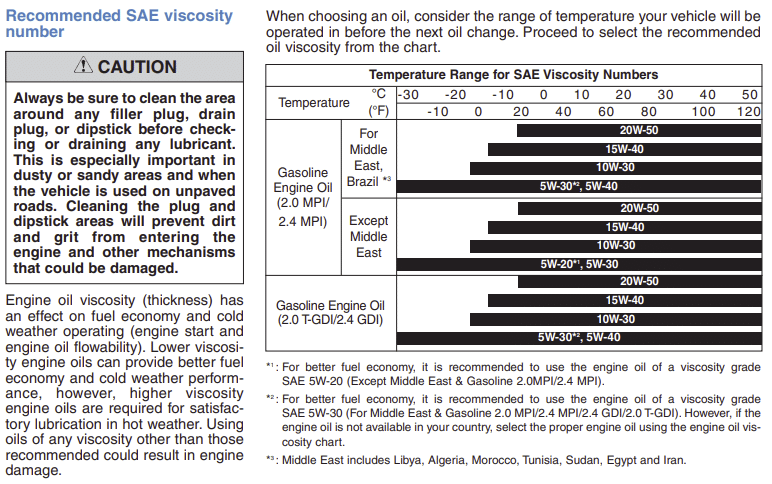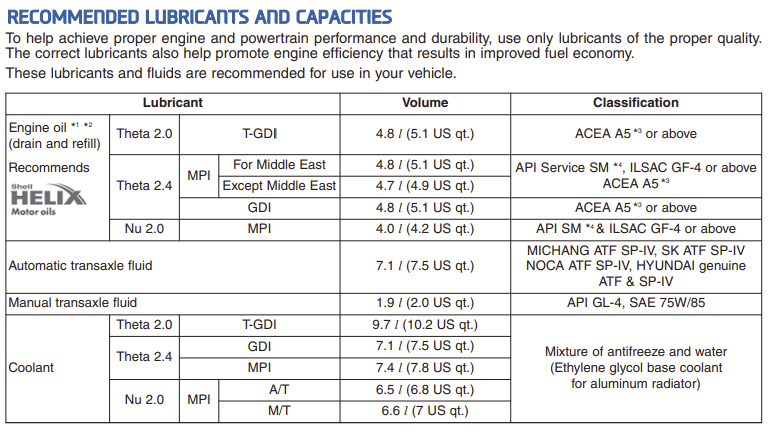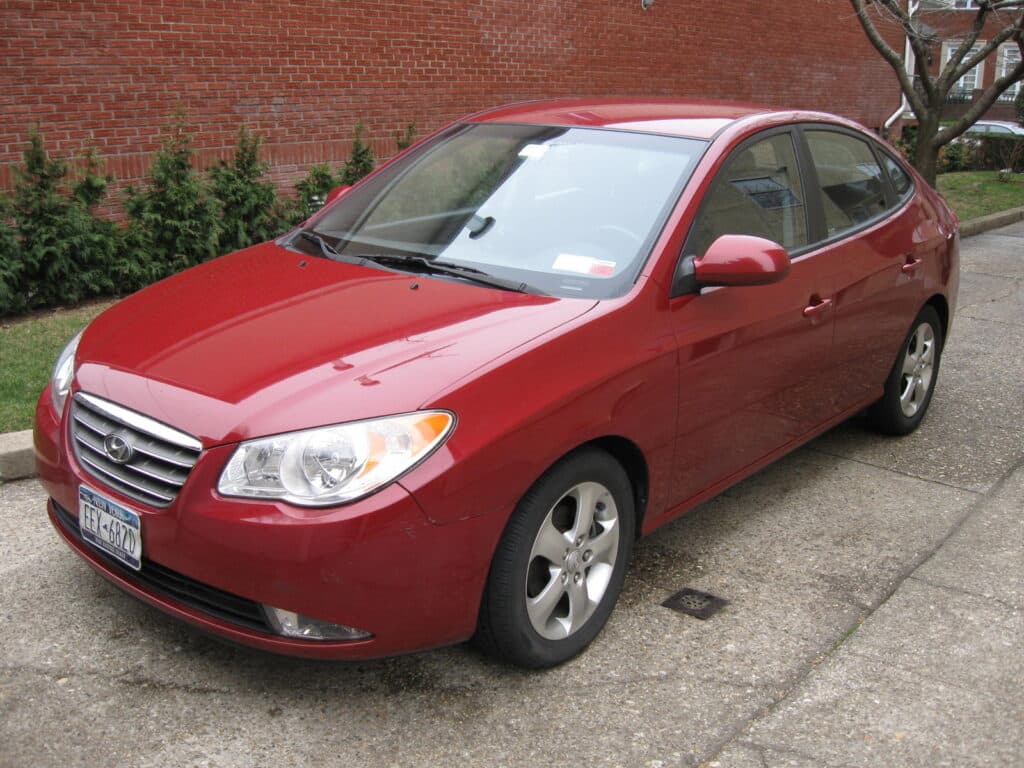The 2016 Hyundai Sonata is a stylish and versatile midsize sedan that offers an impressive combination of comfort, performance, and technology. With a range of powerful engine options, including the 2.0 T-GDI, 2.4 GDI, and Nu 2.0 MPI, the Sonata caters to various driving preferences and needs. Its spacious interior, advanced safety features, and fuel-efficient performance make it a popular choice among car enthusiasts and families alike.
Engine oil plays a vital role in the overall performance and longevity of your 2016 Hyundai Sonata. It provides essential lubrication to reduce friction and wear on the engine’s moving parts, ensuring smooth and efficient operation. Furthermore, it helps to maintain the engine’s temperature by dissipating heat generated during combustion. Selecting the right engine oil type and viscosity and adhering to the recommended oil change intervals is crucial for maximizing your Sonata’s performance, fuel economy, and engine lifespan.
2016 Hyundai Sonata Engine Oil Viscosity
Engine oil viscosity refers to the oil’s resistance to flow at specific temperatures. Lower-viscosity oils tend to flow more easily, making them ideal for improving fuel economy and ensuring optimal cold-weather performance. This is because they allow the engine to start and run more efficiently in colder temperatures, leading to less strain on the engine components and a reduced risk of damage. However, higher-viscosity oils are necessary for adequate lubrication and protection in hot weather, as they maintain their protective film and don’t break down as easily under high temperatures.
The manufacturer recommends several engine oil options for the 2016 Hyundai Sonata equipped with the 2.0 T-GDI and 2.4 GDI engines. These include 20W-50, 10W-30, 15W-40, 5W-30, and 5W-40. When selecting an engine oil, choosing one that meets the required standards for your specific engine type is essential. For the Theta 2.0 T-GDI and Theta 2.4 GDI engines, the recommended engine oil should have ACEA A5 or above certification.

When selecting the appropriate engine oil for your 2016 Hyundai Sonata, it is crucial to consider the range of temperatures in which your vehicle will be operated before the next oil change. In regions with predominantly cold weather, lower-viscosity oils are recommended to ensure proper engine start-up and oil flowability. Conversely, in areas with predominantly hot temperatures, higher-viscosity oils provide the necessary lubrication and protection for the engine.
Always consult your owner’s manual for the manufacturer’s recommended oil viscosity grades based on your driving conditions and the expected temperature range. This will help you choose the most suitable engine oil to maintain your Sonata’s performance, fuel efficiency, and engine health.
For optimal fuel economy in your 2016 Hyundai Sonata, it is recommended to use engine oil with a viscosity grade of SAE 5W-20. This lower-viscosity oil provides better fuel efficiency by reducing internal friction and allowing for easier engine start-ups and oil flowability, particularly in colder temperatures. By selecting the appropriate engine oil and following the manufacturer’s guidelines, you can maximize your Sonata’s performance, fuel economy, and engine lifespan.
2016 Hyundai Sonata Oil Capacity
For the 2016 Hyundai Sonata equipped with the Theta 2.0 T-GDI engine, the recommended engine oil capacity is 4.8 liters (5.1 US quarts) when changing both the engine oil and filter. Ensure you are using engine oil that meets the ACEA A5 or above certification for optimal performance and protection.

For the Theta 2.4 GDI engine variant of the 2016 Hyundai Sonata, the required engine oil capacity is also 4.8 liters (5.1 US quarts) when performing an engine oil and filter change. As with the 2.0 T-GDI engine, it is important to use engine oil that has ACEA A5 or above certification.
For the 2016 Hyundai Sonata with the Nu 2.0 MPI engine, the recommended engine oil capacity is slightly lower at 4.0 liters (4.2 US quarts) when changing both the engine oil and filter. For this engine type, the suitable engine oil should meet API SM & ILSAC GF-4 or above certification standards.
Engine Oil Types for Different Engines
For the 2016 Hyundai Sonata with the Theta 2.0 T-GDI engine, the recommended engine oil should meet ACEA A5 or above certification standards. The suitable viscosity options include 20W-50, 10W-30, 15W-40, 5W-30, and 5W-40. However, for improved fuel economy, it is recommended to use SAE 5W-20 viscosity-grade oil.
The Theta 2.4 GDI engine in the 2016 Hyundai Sonata also requires engine oil that meets ACEA A5 or above certification standards. The recommended viscosity options are the same as for the 2.0 T-GDI engine: 20W-50, 10W-30, 15W-40, 5W-30, and 5W-40. As with the 2.0 T-GDI engine, using SAE 5W-20 viscosity grade oil is recommended for better fuel economy.
For the Nu 2.0 MPI engine in the 2016 Hyundai Sonata, the appropriate engine oil should meet API SM & ILSAC GF-4 or above certification standards. The engine oil viscosity options for this engine include 20W-50, 10W-30, 15W-40, 5W-30, and 5W-40. Like the other two engine variants, it is recommended to use SAE 5W-20 viscosity grade oil for optimal fuel economy.
Engine Oil and Filter Change Intervals
For the 2016 Hyundai Sonata, the regular maintenance intervals for engine oil and filter changes depending on the specific engine type:
- Theta 2.0 T-GDI: Initially, replace the engine oil and filter at 5,000 km (3,000 miles) or six months. After the first change, replace them every 8,000 km (5,000 miles) or six months, whichever comes first.
- Nu 2.0 MPI, Theta 2.4 MPI, and Theta 2.4 GDI: Replace the engine oil and filter every 10,000 km (6,200 miles) or 12 months, whichever comes first.
If the 2016 Hyundai Sonata is driven under severe conditions, more frequent oil and filter changes are required. Severe driving conditions include:
- Repeated short-distance driving
- Driving in dusty, sandy, or muddy conditions
- Extensive idling and low-speed driving for long distances
- Driving in areas with high salt content or using salted roads
- Driving on rough or unpaved roads
- Driving in areas with extreme temperatures or in mountainous regions
In these situations, consult your Hyundai dealer or refer to your owner’s manual for specific guidelines on the appropriate engine oil and filter change intervals for your driving conditions.
Signs Your Engine Oil Needs Changing
Decreased Fuel Efficiency
One of the first signs that your engine oil needs changing is a decrease in fuel efficiency. When the oil becomes dirty or loses its viscosity, it can no longer lubricate the engine components effectively, leading to increased friction and reduced fuel efficiency.
Dark or Dirty Oil
Clean engine oil has a light amber color, but over time, it becomes darker and dirtier due to the accumulation of particles from the engine. If you notice that your engine oil is dark or dirty when checking the oil level using the dipstick, it’s time to change the oil.
Unusual Engine Noises or Performance Issues
If you experience unusual engine noises, such as knocking, ticking, or other metallic sounds, it could indicate that the engine oil has lost its lubricating properties. The same applies to performance issues like poor acceleration, rough idling, or stalling. These signs might indicate that your engine oil needs to be changed.
Check Engine or Oil Change Warning Lights
Modern vehicles like the 2016 Hyundai Sonata come with advanced monitoring systems that can alert you when it’s time for an oil change. If the check engine light or oil change warning light illuminates your dashboard, it’s essential to address the issue promptly and replace the engine oil as necessary. Always consult your owner’s manual or a professional mechanic if you’re unsure about the cause of the warning light.

Synthetic vs. Conventional Oil
Synthetic and conventional oils are both derived from crude oil but undergo different refining processes. Conventional oil, also known as mineral oil, is a refined petroleum product. In contrast, synthetic oil is made by further breaking down and reassembling the base molecules to create a more uniform and stable product.
There are several advantages to using synthetic oil in your 2016 Hyundai Sonata, including:
- Improved Lubrication: Synthetic oils provide better lubrication for your engine’s moving parts, reducing friction and wear. This results in improved engine performance and longer engine life.
- Enhanced Temperature Resistance: Synthetic oils maintain their viscosity and continue to provide protection at both high and low temperatures, making them suitable for various driving conditions.
- Reduced Oil Breakdown: Synthetic oils are less prone to oxidation and degradation over time, allowing them to maintain their protective properties for longer periods.
- Better Fuel Economy: The enhanced lubrication and reduced friction provided by synthetic oils can contribute to improved fuel economy, ultimately saving you money at the gas pump.
- Extended Oil Change Intervals: Due to the reduced breakdown and superior performance characteristics of synthetic oils, you may be able to extend the intervals between oil changes, saving time and money on maintenance.
While synthetic oils may come with a higher price tag than conventional oils, the benefits they provide can outweigh the additional cost in the long run, making them a worthy investment for your 2016 Hyundai Sonata. Always refer to your owner’s manual for the recommended oil type and change intervals specific to your vehicle.
Conclusion
Choosing the right engine oil and adhering to recommended maintenance schedules are essential to keep your 2016 Hyundai Sonata running smoothly and reliably. Using the recommended oil type and changing it at the recommended intervals can ensure optimal engine performance and prolong your vehicle’s lifespan.
Regular oil changes and proper oil selection offer several benefits, including better fuel efficiency, improved engine performance, reduced wear and tear on engine parts, and longer engine life. By paying attention to signs that your engine oil needs changing and choosing the right oil type for your driving conditions, you can keep your Sonata running at its best.
Remember always to refer to your owner’s manual for recommended maintenance schedules and the appropriate engine oil type for your 2016 Hyundai Sonata. Following these guidelines ensures that your vehicle operates at peak performance, providing you with a safe and reliable driving experience.










